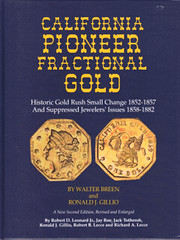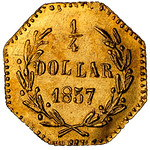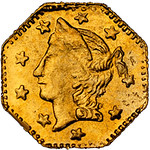
PREV ARTICLE
NEXT ARTICLE
FULL ISSUE
PREV FULL ISSUE
COUNTERFEIT CALIFORNIA FRACTIONAL GOLD
An article by Max Spiegel in Coin Week discusses diagnostics of counterfeit California gold pieces. -Editor
California Fractional Gold is an interesting and historically significant series that includes more than 500 varieties. During the California Gold Rush there was a shortage of small change and beginning in 1852 several jewelers privately minted gold quarters, half dollars, and dollars. The San Francisco Mint opened on April 3, 1854 and within a few years enough small change had been issued to eliminate the necessity for these minuscule gold tokens.
ll California Fractional Gold from Periods One and Two are denominated. Usually they will have the word DOLLAR (with a fraction if a quarter or half dollar), but there are also some that are denominated in cents. Occasionally you will see the word DOLLAR abbreviated as DOL, DOLL, or even DOLA. Although the Coinage Act of April 22, 1864 made it illegal to privately mint coinage, the law was not enforced by the Secret Service until 1883 and thus jewelers were still able to denominate their souvenir tokens. The tokens struck in 1883 and later almost always do not have a denomination (in order to comply with the law) and instead might say “1/2 CAL GOLD” or “1/2 CALIFORNIA GOLD CHARM”.
Perhaps the best defense against imitation California Fractional Gold would be a copy of Walter Breen and Ronald J. Gillio’s California Pioneer Fractional Gold (Second Edition, 2003). To read the complete article, see:
Wayne Homren, Editor The Numismatic Bibliomania Society is a non-profit organization promoting numismatic literature. See our web site at coinbooks.org. To submit items for publication in The E-Sylum, write to the Editor at this address: whomren@gmail.com To subscribe go to: https://my.binhost.com/lists/listinfo/esylum All Rights Reserved. NBS Home Page Contact the NBS webmaster 
|


